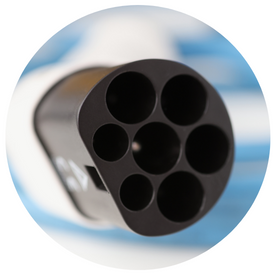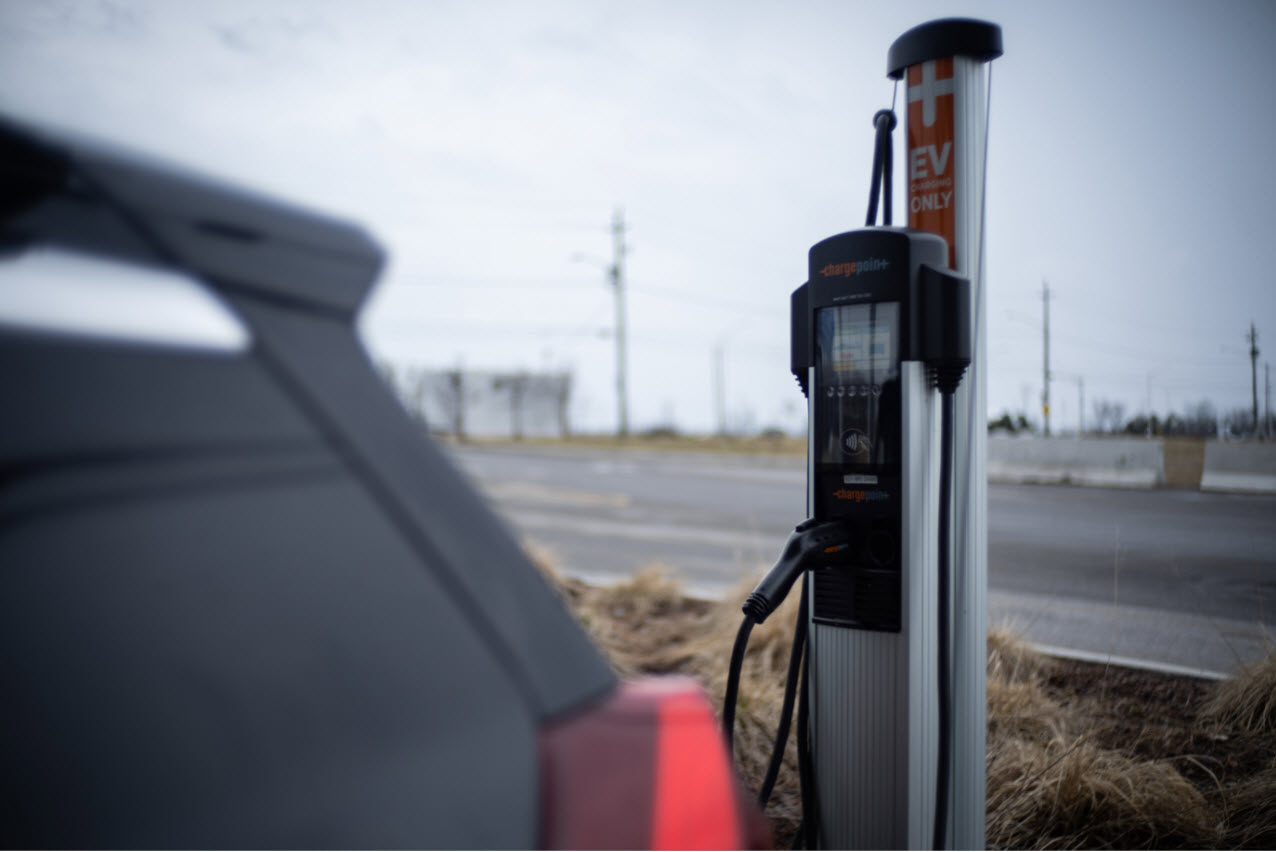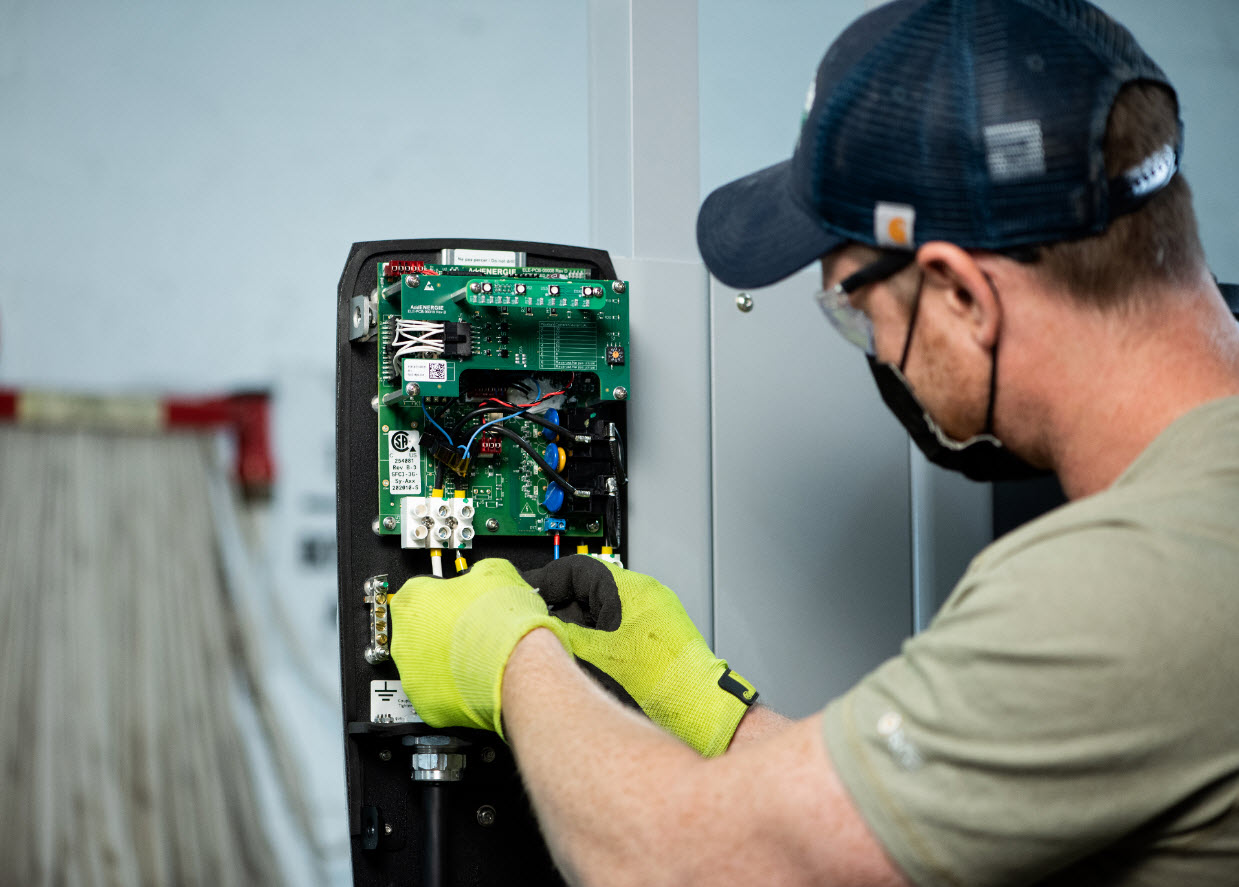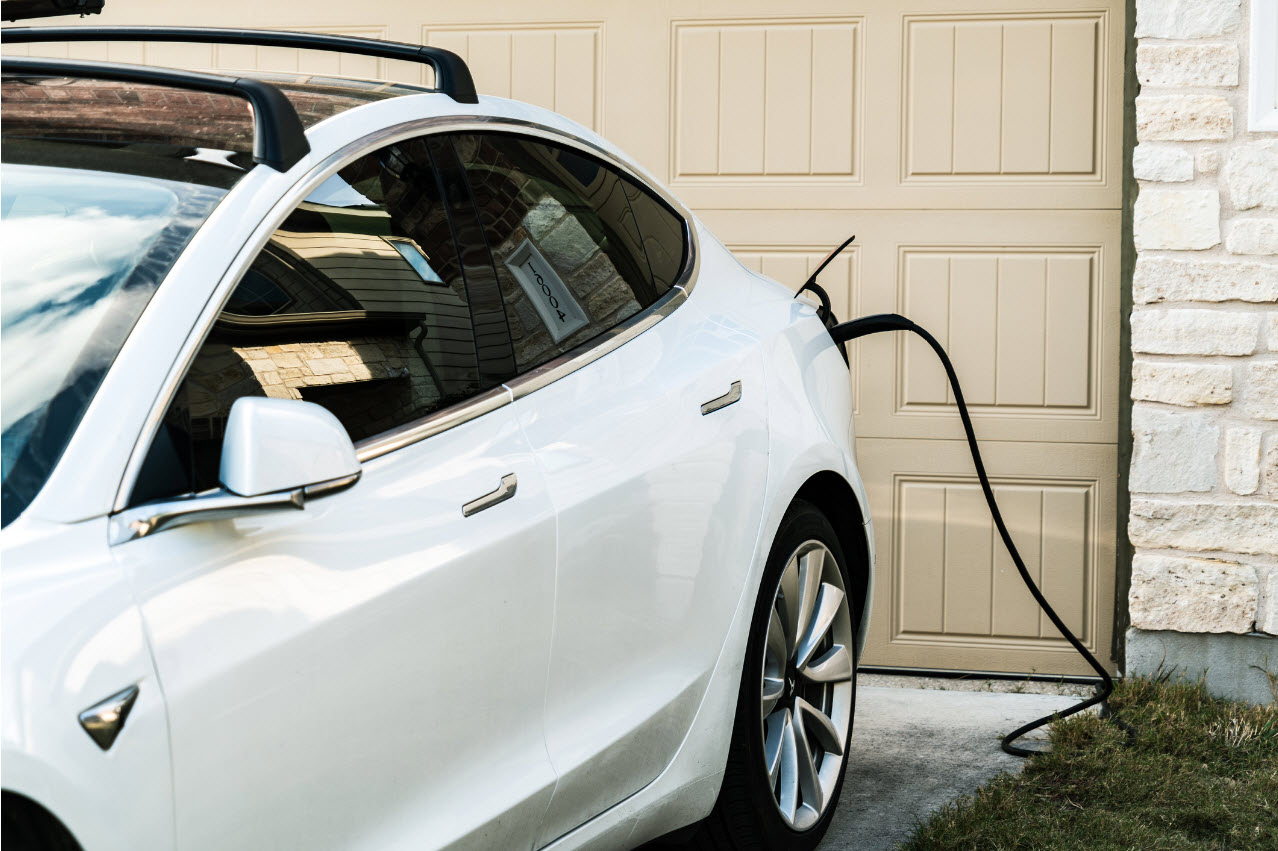Electric vehicles (EVs)
Ottawa plugs into green transportation
Electric vehicles (EVs)
Electric vehicles (EVs) make sense for drivers and businesses in Ottawa – both economically and environmentally.

Why electric vehicles (EVs)?
EVs are 70 to 90 per cent greener than gas cars, making them cheaper to operate and maintain. EVs also perform better, with quick acceleration, smooth handling and a quiet ride.

How do EVs work?
Battery-electric vehicles (or BEVs) run 100 per cent on electricity with a battery pack that powers an electric drivetrain. When depleted, the battery is recharged from a wall socket or a dedicated charging unit. Plug-in hybrid electric vehicles (or PHEVs) also have an electric motor and battery but use a gas engine when the battery runs low.
Electric vehicle pricing in Canada ranges from $32,000 to $160,000. Electric vehicles come in different sizes from compact to midsize to SUV, with more than 90 makes and models currently available in Canada, and more being announced every year. The average annual cost of charging EVs using electricity at home is an estimated $300. Therefore, by transferring from a gas car to an EV, an average Canadian driver that travels 20,000 km each year can save as much as $2,000 per year on fuel alone.
Overall, EVs are much cheaper to operate and maintain than gas cars. EV drivers experience up to 60% savings on maintenance costs and 50% savings on fuel costs, preserving thousands of dollars for owners over the EV’s lifespan.
According to Ontario’s Ministry of Transportation: on average, a typical battery EV will cost approximately $300 per year, which equates to about $0.82 a day to charge each night. *1
A typical plug-in hybrid EV will cost about $700 per year, or $1.92 a day for fuel (including gasoline and electricity costs). *2
The annual fuel and maintenance costs of gasoline cars range between $1,000 and $2,500, which is up to eight times more money daily than an EV. *3
To find out more about EVs, visit Plug’n Drive. This non-profit organization is a trusted and unbiased source of information on electric cars and charging stations.
While charging overnight, EVs use electricity from the grid to warm and condition the battery so EVs start like a charm in cold weather. But extreme cold, -20⁰C or colder, can drop the range an EV can drive without charging by 40 to 50 per cent because the EV must draw power to keep the battery warm and heat the car’s interior. Nevertheless, there’s still enough EV driving range on a single charge to meet the daily driving needs of most Canadians.
EVs must pass the same rigorous safety tests as gas cars and are fully licensed to drive on Canada’s roads and highways. EVs also offer the same comfort options in winter that gas cars do, such as heated seats and heated steering wheels.
If you would like to install a Level 2 EV charging station in your home, here are some important facts to remember:
- You must hire a Licensed Electrical Contractor to install the charging station and to ensure that the installation complies with all regulations under the Ontario Electrical Safety Code.
- You should make sure that the installer takes out a permit with the Electrical Safety Authority (ESA) before starting the installation of your EV charging station.
- You should confirm that all the installed equipment is certified for use in Canada by a nationally recognized certification agency – CSA, cUL, cETL – or displays other certification marks approved by the ESA.
- You and/or your contractor will receive a Certificate of Inspection from the ESA once the installation is deemed in compliance with the Ontario Electrical Safety Code.
For more information about EV charging station installation, visit www.esasafe.com.
Battery electric cars sold today can travel between 350 to 450 km on a single charge, while plug-in hybrids and extended range EVs can travel more than 500 kilometres using a combination of battery and efficient gasoline engine technology. Since most Canadians drive 50 km or less per day, these travel ranges are well within the daily needs of most drivers in Canada.
Note that EVs don't run out of charge unexpectedly. As with gas vehicles, a dashboard display indicates the level of charge and the estimated driving range. EVs also perform more efficiently at stoplights or in traffic jams. When an EV stops, its electric motor doesn’t draw energy from the battery, but gas engines continue to burn fuel even when stopped.
All EVs come standard with a cord set that lets you charge the battery using a regular wall socket, also known as Level 1 or 120 volts charging. At Level 1, BEVs can take up to 50 hours to charge from empty to 80%, whereas PHEVs can be charged in 5 to 6 hours.
Level 2 charging stations use a 240-volt system (similar to a clothes dryer or stove plug) and can fully charge a battery electric vehicle in about 4 to 10 hours and a plug-in hybrid in about 1 to 2 hours.
In addition to recharging at home, you can recharge your EV at publicly available charging stations. Out of the 7,000 charging stations across Canada, over 200 Level 2 and Level 3 stations can be found in Ottawa, with a growing number of fast-charging Level 3 stations in Ontario. Level 3 stations can charge an EV battery from empty to 80% in about 20 to 30 minutes, which is at least eight times faster than a Level 2 charging station.
Under the Electric Vehicle Chargers Ontario (EVCO) program, more than 140 Level 3 charging stations and almost 200 Level 2 stations have been installed across Ontario. Ottawa currently has nine Level 3 stations and six Level 2 stations installed, with more coming soon as Minister Wilkinson announced an effort to install nearly 3,000 new chargers in Ontario. With the support of 30 Ontario-based partner organizations, there will be 1,908 Level 2 chargers and 100 Level 3 chargers to be installed.
Throughout the province, charging stations are typically located in or close to major attractions, restaurants, shopping mall parking lots, businesses and municipal properties for in-city travel. The Level 3 or fast-charging stations are generally located along highways and other major roadways to ease inter-city travel for EV drivers.
Across Canada, there are almost 7,000 public charging stations, many of which are Level 3 fast-chargers. To find a public charging station in Ottawa, other cities or along your route, visit:

Fuel efficient
With an EV, you use no fuel or less fuel, which can reduce your vehicle operating costs significantly.

Affordable
Electricity is cheaper than gasoline and EV maintenance is minimal.

Low Maintenance
EV drivers save upwards of 60 per cent on maintenance costs, because electric motors typically don’t break down as much as gas engines. Say goodbye to oil changes, fluid top-ups and broken mufflers.

Eco-friendly
EVs are 70 to 90 per cent greener than gas-powered vehicles and EV batteries are made from Lithium-ion, which are 90 percent recyclable.

Fun to Drive
Electric cars deliver full torque right away, providing responsive, fast and smooth acceleration. EVs also feature remarkable handling and stability thanks to a lower centre of gravity.

Fit your Life
EV drivers in Ontario can get “green” license plates, allowing them to drive in all provincial high occupancy vehicle (HOV) lanes – even with only one person on board.
Find a place to charge up
Continue the journey through our blogs

EVs and winter: do they mix?

EV Adoption: The grid, the battery and the Evangelist

Four EV charging tips to know before you buy a vehicle

The future is electrifying

The Dos and Don’ts of Public Charging

All Charged Up
